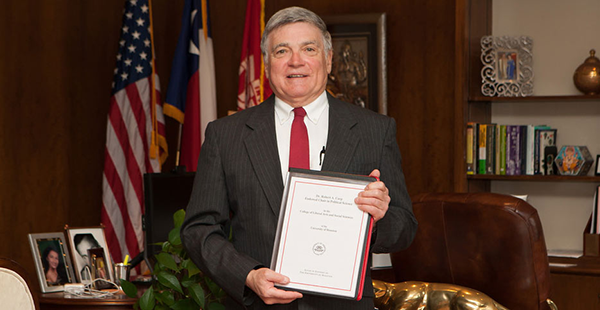Professor Carp Boosts Political Science Department with a Planned Gift

Professor Robert Carp, Ph.D. taught more than Constitutional Law to Patrick Hanley while the latter was an undergraduate student at the University of Houston. Carp also taught Hanley how to think and discuss just as a lawyer does. Reading case studies instead of a text book, students found Carp’s class to be exponentially more difficult than any other course—and more enlightening. Reading texts directed at seasoned lawyers as an undergraduate was challenging, but it prepared Hanley for his Law School career at Rutgers University in New Jersey. Looking back, Carp’s teaching focused more on “robust discussions than argument,” discussion being an element Hanley felt was often overlooked in Law School. It is a skill that has served him well in the years since, working as an analyst in hospital regulatory compliance for medical research at University of Texas MD Anderson Cancer Center.
Carp is a seasoned professional academician, as Professor Kenneth Manning, his long-time collaborator knows. Professor Manning has co-investigated a database on federal district court decision-making and co-authored the quintessential textbook, “Judicial Process in America” with Carp and Ronald Stidham. Manning was a hard-working, 27- year-old graduate student of Carp’s nearly 20 years ago, and he eventually followed in his mentor’s footsteps to become a Professor of Political Science at the University of Massachusetts, Dartmouth. Neither Manning nor Hanley were surprised at the news that Carp had funded an endowed chair in the Political Science Department at University of Houston. Through a planned gift, Carp will empower UH’s Political Science Department to attract or retain a professor with a national reputation. According to Professor Susan Scarrow, also in the Political Science department at UH, this allows the endowed chair to travel to conferences to present research, to purchase computer software and hardware, to hire a research assistant and may be used to provide a summer research stipend for the person who holds the chair. This gift will effectively underwrite a professor and, as Manning puts it, “will raise the overall reputation of the Political Science department, and in turn, the whole of UH.”
“His generous gift is entirely keeping with his extraordinary character,” says Manning. And above all, there is an overwhelming feeling that professor Carp is sensible. “He’s going to do something good with it,” he says simply of Carp’s gift. And with planned gifts, an individual can leave a percentage of their estate—1 to 100 percent—so that no matter how the size of their estate changes over the years, gifts to family and charities remain proportionate.
Manning says it will be a prestigious honor for anyone who can say, “I was hired to fulfill the Carp Endowed Professorship.” The message of this particular gift, adds Hanley, is that “there is a belief that to be a philanthropist, you must be part of the 1 percent. Professor Carp’s gift shows that we all have the opportunity to invest in things that are important to us.”